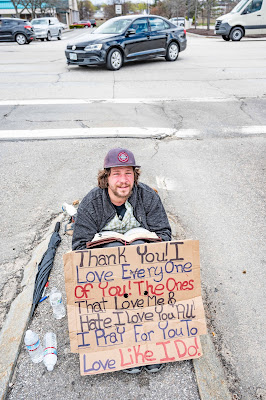 |
| Nicholas Nault, homeless by Fort Eddy Road CC Jean Stimmell |
Leo Tolstoy wrote “What Then Must We Do?” back in 1887: ‘I sit on a man’s back, choking him and making him carry me, and yet assure myself and others that I am very sorry for him and wish to ease his lot by all possible means – except by getting off his back.’
He wrote this book of moral and political philosophy at a time when he had stopped writing novels and was devoting himself to trying to alert people to the insanity of modern life, including its violence and social injustice.
I share his angst now when things in America appear as crazy as when Tolstoy wrote. I become incensed whenever I shop on Fort Eddy Road and see the homeless panhandling. It bothers me when I give them a few bucks and bothers me more when I don’t. My anger is fueled by guilt and shame that our state has come to this, forcing people to beg in the street because of circumstances beyond their control, whether from mental illness, disability, or the price of housing is beyond what they can afford.
I admire Tolstoy for “his willingness to think outside the box, to offer a radical assessment of social reality that most people most of the time simply accept as a given.” And I applaud Matthew Desmond’s new book, Poverty By America,1 which wrestles with the same problem that Tolstoy did: why is there so much poverty around me?
Homelessness in NH is “Exponentially worse today than it was three or four years ago,” according to Craig Henderson with Southwestern Community Services. He says rising costs are contributing to the crisis. “Whether it was rent oil, fuel, food. So, people who were living at the cusp of homelessness now simply can’t live.”2
In addition, we have an alarming housing shortage; this lack of supply is pushing the cost of renting out of sight. A new report by NH Housing discovered that the deficit is much worse than previously indicated. In the next two decades, we will need 90,000 additional units just to catch up.3
It will take a shift in public consciousness to make the necessary changes, starting with a radical change in our zoning laws, forcing towns and cities to mandate more affordable housing, including more multiple-family dwellings. But that only scratches the surface!
Our whole attitude needs to change. As a nation, we stand in a class by ourselves, permitting poverty to blossom like runaway algae, unlike any other industrialized nation. As a fabulously wealthy country, we could virtually eliminate poverty if we wanted to – but we don’t.
Poverty persists, according to Desmond, because too many of us, with varying degrees of self-awareness, benefit from its perpetuation. He points out we are just as generous with our assistance as those European welfare states: the only difference is we don’t give it to folks experiencing poverty: Instead, “The biggest beneficiaries of federal aid are affluent families.”
Desmond says, “Poverty infringes on American prosperity, making it a barricaded, stingy, frightened kind of affluence.” How can we not experience “emotional violence” from “knowing that our abundance causes others’ misery?”
Rather than guiltily slinking by the homeless on Fort Eddy Road, let’s stand up for them: no one should be doomed just because they’re poor.
xxx
1 https://www.nytimes.com/2023/04/21/podcasts/ezra-klein-podcast-transcript-matthew-desmond.html
2 “NH homeless crisis persists as emergency hotel program ends”
April 6, 2023: Vermont Station: WCAX


